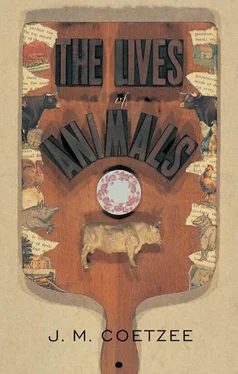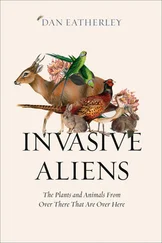“That is not what Red Peter was striving for when he wrote, through his amanuensis Franz Kafka, the life history that, in November of 1917, he proposed to read to the Academy of Science. Whatever else it may have been, his report to the academy was not a plea to be treated as a mentally defective human being, a simpleton.
“Red Peter was not an investigator of primate behavior but a branded, marked, wounded animal presenting himself as speaking testimony to a gathering of scholars. I am not a philosopher of mind but an animal exhibiting, yet not exhibiting, to a gathering of scholars, a wound, which I cover up under my clothes but touch on in every word I speak.
“If Red Peter took it upon himself to make the arduous descent from the silence of the beasts to the gabble of reason in the spirit of the scapegoat, the chosen one, then his amanuensis was a scapegoat from birth, with a presentiment, a Vorgefühl , for the massacre of the chosen people that was to take place so soon after his death. So let me, to prove my goodwill, my credentials, make a gesture in the direction of scholarship and give you my scholarly speculations, backed up with footnotes”—here, in an uncharacteristic gesture, his mother raises and brandishes the text of her lecture in the air—“on the origins of Red Peter.
“In 1912 the Prussian Academy of Sciences established on the island of Tenerife a station devoted to experimentation into the mental capacities of apes, particularly chimpanzees. The station operated until 1920.
“One of the scientists working there was the psychologist Wolfgang Köhler. In 1917 Köhler published a monograph entitled The Mentality of Apes describing his experiments. In November of the same year Franz Kafka published his ‘Report to an Academy.’ Whether Kafka had read Köhler’s book I do not know. He makes no reference to it in his letters or diaries, and his library disappeared during the Nazi era. Some two hundred of his books reemerged in 1982. They do not include Köhler’s book, but that proves nothing.{Patrick Bridgwater says that the origins of the “Report” lie in Kafka’s early reading of Haeckel, while he got the idea for a story about a talking ape from the writer M. M. Seraphim. “Rotpeters Ahnherren,” Deutsche Vierteljahrsschrift 56 (1982): 459. On the chronology of Kafka’s publications in 1917, see Joachim Unseld, Franz Kafka: Ein Schriftstellerleben (Munich: Hanser, 1982), 148. On Kafka’s library, see Karl, Franz Kafka , 632.}
“I am not a Kafka scholar. In fact I am not a scholar at all. My status in the world does not rest on whether I am right or wrong in claiming that Kafka read Köhler’s book. But I would like to think he did, and the chronology makes my speculation at least plausible.
“According to his own account, Red Peter was captured on the African mainland by hunters specializing in the ape trade, and shipped across the sea to a scientific institute. So were the apes Köhler worked with. Both Red Peter and Köhler’s apes then underwent a period of training intended to humanize them. Red Peter passed his course with flying colors, though at deep personal cost. Kafka’s story deals with that cost: we learn what it consists in through the ironies and silences of the story. Köhler’s apes did less well. Nevertheless, they acquired at least a smattering of education.
“Let me recount to you some of what the apes on Tenerife learned from their master Wolfgang Köhler, in particular Sultan, the best of his pupils, in a certain sense the prototype of Red Peter.
“Sultan is alone in his pen. He is hungry: the food that used to arrive regularly has unaccountably ceased coming.
“The man who used to feed him and has now stopped feeding him stretches a wire over the pen three meters above ground level, and hangs a bunch of bananas from it. Into the pen he drags three wooden crates. Then he disappears, closing the gate behind him, though he is still somewhere in the vicinity, since one can smell him.
“Sultan knows: Now one is supposed to think. That is what the bananas up there are about. The bananas are there to make one think, to spur one to the limits of one’s thinking. But what must one think? One thinks: Why is he starving me? One thinks: What have I done? Why has he stopped liking me? One thinks: Why does he not want these crates any more? But none of these is the right thought. Even a more complicated thought—for instance: What is wrong with him, what misconception does he have of me, that leads him to believe it is easier for me to reach a banana hanging from a wire than to pick up a banana from the floor?—is wrong. The right thought to think is: How does one use the crates to reach the bananas?
“Sultan drags the crates under the bananas, piles them one on top of the other, climbs the tower he has built, and pulls down the bananas. He thinks: Now will he stop punishing me?
“The answer is: No. The next day the man hangs a fresh bunch of bananas from the wire but also fills the crates with stones so that they are too heavy to be dragged. One is not supposed to think: Why has he filled the crates with stones? One is supposed to think: How does one use the crates to get the bananas despite the fact that they are filled with stones?
“One is beginning to see how the man’s mind works.
“Sultan empties the stones from the crates, builds a tower with the crates, climbs the tower, pulls down the bananas.
“As long as Sultan continues to think wrong thoughts, he is starved. He is starved until the pangs of hunger are so intense, so overriding, that he is forced to think the right thought, namely, how to go about getting the bananas. Thus are the mental capabilities of the chimpanzee tested to their uttermost.
“The man drops a bunch of bananas a meter outside the wire pen. Into the pen he tosses a stick. The wrong thought is: Why has he stopped hanging the bananas on the wire? The wrong thought (the right wrong thought, however) is: How does one use the three crates to reach the bananas? The right thought is: How does one use the stick to reach the bananas?
“At every turn Sultan is driven to think the less interesting thought. From the purity of speculation (Why do men behave like this?) he is relentlessly propelled toward lower, practical, instrumental reason (How does one use this to get that?) and thus toward acceptance of himself as primarily an organism with an appetite that needs to be satisfied. Although his entire history, from the time his mother was shot and he was captured, through his voyage in a cage to imprisonment on this island prison camp and the sadistic games that are played around food here, leads him to ask questions about the justice of the universe and the place of this penal colony in it, a carefully plotted psychological regimen conducts him away from ethics and metaphysics toward the humbler reaches of practical reason. And somehow, as he inches through this labyrinth of constraint, manipulation, and duplicity, he must realize that on no account dare he give up, for on his shoulders rests the responsibility of representing apedom. The fate of his brothers and sisters may be determined by how well he performs.
“Wolfgang Köhler was probably a good man. A good man but not a poet. A poet would have made something of the moment when the captive chimpanzees lope around the compound in a circle, for all the world like a military band, some of them as naked as the day they were born, some draped in cords or old strips of cloth that they have picked up, some carrying pieces of rubbish.
“(In the copy of Köhler’s book I read, borrowed from a library, an indignant reader has written in the margin, at this point: ‘Anthropomorphism!’ Animals cannot march, he means to say, they cannot dress up, because they don’t know the meaning of march , don’t know the meaning of dress up .)
Читать дальше












